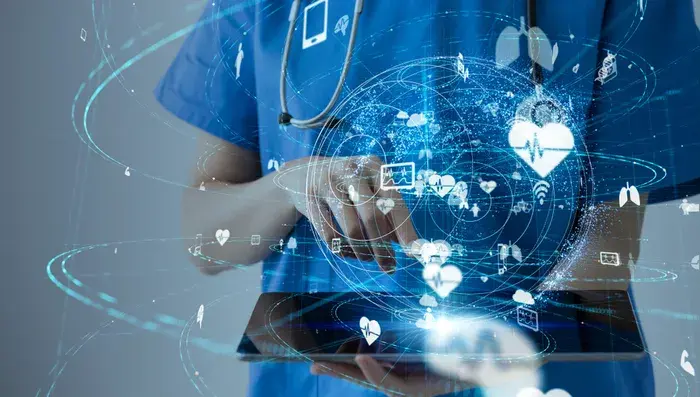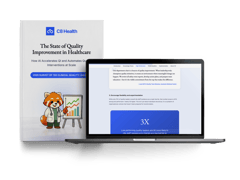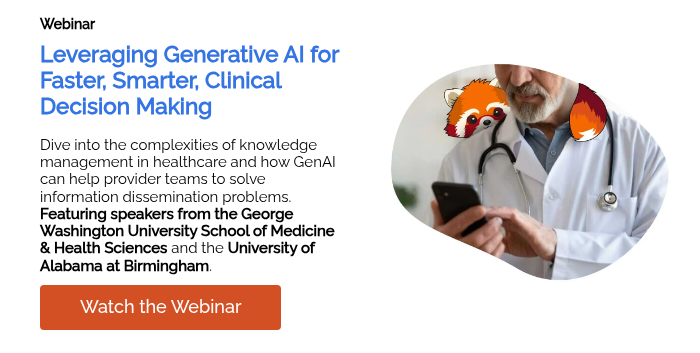
Latest Advancements and Trends in Medical Technology
The healthcare industry is transforming as technology merges with traditional medicine. With nearly a quarter of U.S. healthcare providers integrating artificial intelligence and machine learning, we're witnessing a shift in clinical care and treatment, with a bright outlook for better patient outcomes and a healthier future.
As AI becomes increasingly adopted by every person and industry, there are a number of advancements and trends in medical technology to keep an eye on. Let's look at how AI, electronic health records, and wearables are changing healthcare and promise more effective, efficient coordinated care.
Meet the Expert
Mical DeBrow is an accomplished healthcare leader and clinician with extensive expertise spanning pharma, healthcare payers and providers, and healthcare information technology.
Artificial Intelligence (AI) and Machine Learning (ML)
Any discussion about medical technology advancements would be incomplete without a nod to the impact of AI. AI is a powerful tool that has the potential to transform the healthcare industry. Its adoption has been gradual, but with younger generations of clinicians entering the field every year, it's becoming increasingly used as a support system designed to enhance clinical practice.
AI in Knowledge Management
AI can provide instant access to a vast amount of knowledge through intelligent knowledge management systems, reducing reliance on memory and enabling real-time, evidence-based care. This can improve decision-making processes, making clinicians more effective and allowing for more meaningful patient interactions.
While integrating AI into existing healthcare systems can be challenging-particularly due to interoperability issues-adopting a patient-centric approach can help.
This approach focuses on the needs of the patient and ensures smooth communication between different systems. So by prioritizing the patient's needs, we can design systems that work together seamlessly, overcoming the interoperability challenges that can arise with AI integration.
In navigating these challenges, we need to identify and close gaps in healthcare. Healthcare centers need to actively protect patient privacy and ensure the security of their systems. By implementing strong cybersecurity measures, we can build trust with patients and clients.
C8 Health's AI-powered search swiftly retrieves information, making your institution's knowledge readily accessible anytime, anywhere. This intelligent care coordination tool enhances patient care by improving efficiency and accessibility, allowing healthcare professionals to focus more on patients and less on administrative tasks.
To learn more about AI and its applications in hospitals, watch our latest webinar.
Machine-Learning Enhanced Diagnostic Capabilities
Medical imaging and serologic testing are getting a helping hand from artificial intelligence (AI), leading to advances in diagnostic capabilities. AI excels in spotting subtle patterns and abnormalities, providing a more comprehensive assessment that helps clinicians make informed decisions quickly.
In radiology, AI algorithms can detect tiny anomalies that might go unnoticed by humans, leading to faster diagnoses and enabling timely interventions. Similarly, AI streamlines serologic testing, automating blood sample analysis to provide faster, more accurate results, reducing the time spent on manual analysis.
AI systems provide clinicians with real-time insights, alerting them to potential problems in medical images or serologic test results. This proactive approach allows clinicians to detect concerns early, triggering further investigation and facilitating more informed treatment decisions.
Essentially, AI acts as a powerful assistant, enhancing clinician expertise to improve diagnostic accuracy and efficiency. This collaborative approach between machines and clinicians lifts patient care to new heights.
» Discover how C8 Health uses AI to simplify processes for your medical team.
Electronic Health Records (EHR)
Electronic health records (EHRs) started out as digital record keepers but their advancements and adoption have been significant. The global EHR market, valued at 29 billion U.S. dollars in 2020, is projected to exceed 47 billion U.S. dollars by 2027.
They were initially designed as digital replicas of patient charts, but now integrate comprehensive patient information. This enables better communication among healthcare providers, and fosters collaborative care across specialties and institutions.
EHRs have gone beyond record-keeping, becoming crucial tools for reducing medical errors. By providing instant access to critical patient data, EHRs empower healthcare providers to make informed decisions quickly and accurately, minimizing the risk of medical errors and patient harm.
What's more, EHRs enhance healthcare efficiency. They serve as central analytics hubs, enabling providers to extract valuable insights from patient information to improve treatment outcomes, optimize resource allocation, and identify emerging population health trends.
Wearables
Wearable devices have transcended their consumer origins to become essential tools in patient monitoring, marking a shift towards active patient engagement in health management. From continuous glucose monitoring for diabetics to cardiac activity monitors, wearables are driving a revolution in personal well-being.
Providing real-time data, these devices enable early detection of health issues, facilitating personalized interventions. This transformative era of wearables empowers individuals to take an active role in their health, fostering a more patient-centric approach in healthcare. Embracing wearable technology aligns with maintaining the well-being of both patients and healthcare professionals alike.
» Learn more about C8 Health's platform for guidance management and care collaboration.
Accessible Clinical Guidance in a Tech-Forward Future
AI and machine learning are transforming clinical practice by providing real-time knowledge, reducing reliance on memory, and allowing more time for patient interaction. The digitization of images, scans, and lab work has significantly improved healthcare.
These advancements, coupled with a central platform for clinical coordination, make up-to-date information readily available at a clinician's fingertips. This shift from traditional methods of reviewing literature and patient records to intelligent coordinated care signifies a major advancement in medical technology.
»Here's how knowledge management systems can reduce healthcare costs.


